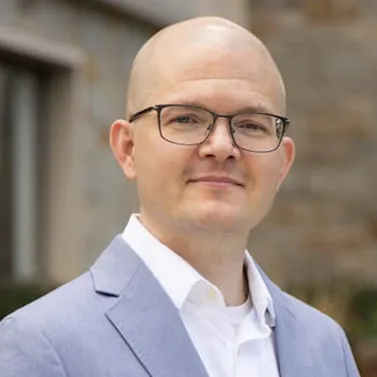Addressing socio-environmental problems often involves the use of qualitative data, such as information that can comes from surveys, interviews, or texts—i.e., information that is not in the form of numbers. In some cases, you can convert qualitative data into quantitative forms; however, there are well developed methods for using it as it is. One example illustrated in this short video clip is called qualitative comparative analysis or QCA, which uses a series of cases from different contexts that are analyzed to ask why change occurs in some cases but not in others. QCA combines mathematical approaches and qualitative information from the case studies to model causal conditions that can account for all the observed outcomes. For more advanced coverage of this and other ways to use qualitative data to address socio-environmental problems, see the 30-minute video by sociologist Andrew Jorgensen that is listed first in the related content below.
-
About the Presenters
Image

Andrew Jorgenson
Dr. Andrew Jorgenson is Professor and Chair in the Department of Sociology, Professor of Environmental Studies, and coordinator of the Global Environmental Sociology Lab at Boston College. Working in the areas of environmental sociology, global political economy, the sociology of development, and sustainability science more broadly, he conducts research on the human dimensions of global and regional environmental change, with a focus on how development, inequality, and the structure of global production and trade networks contribute to greenhouse gas emissions, industrial pollution, land-...
Image
Andrew Jorgenson
Dr. Andrew Jorgenson is Professor and Chair in the Department of Sociology, Professor of Environmental Studies, and coordinator of the Global Environmental Sociology Lab at Boston College. Working in the areas of environmental sociology, global political economy, the sociology of development, and sustainability science more broadly, he conducts research on the human dimensions of global and regional environmental change, with a focus on how development, inequality, and the structure of global production and trade networks contribute to greenhouse gas emissions, industrial pollution, land- cover change, and relationships between environmental conditions and population health. In 2020, Andrew received the Fred Buttel Distinguished Contribution Award from the American Sociological Association’s Section on Environmental Sociology for his innovation, publication, and service in the field of environmental sociology. He was recently appointed by the U.S. Global Change Research Program to serve as an author for the Fifth National Climate Assessment, which is scheduled for completion in 2023. He is the founding co-editor of Sociology of Development, a journal published by University of California Press, and he serves on the editorial board for various journals.